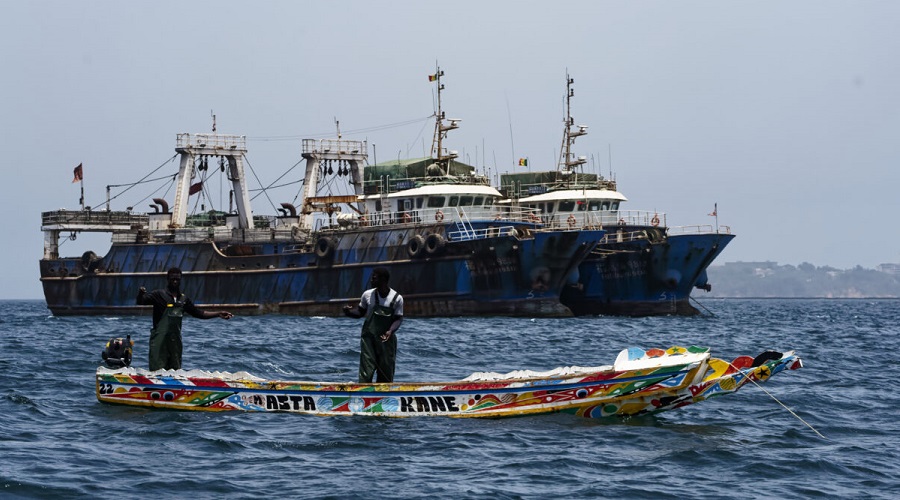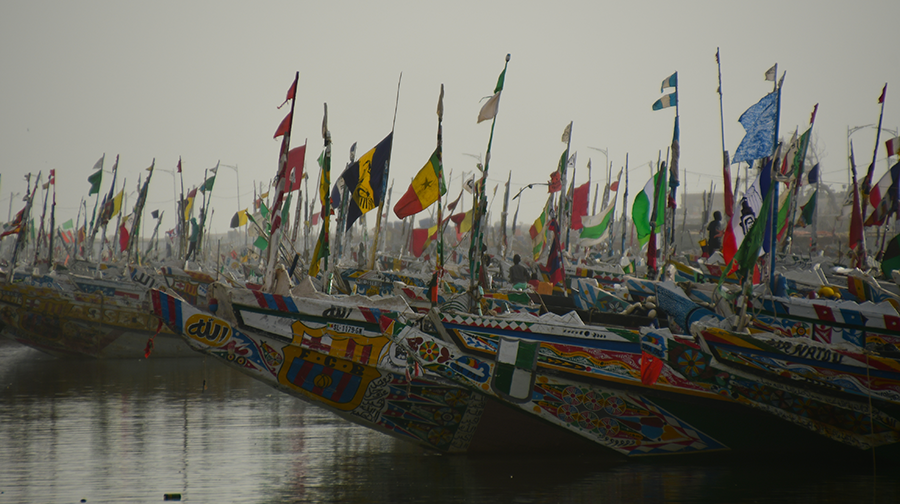
Port of Dakar. Photo by Garth Cripps ©, Coalition for Fisheries Transparency.
The decades-long overexploitation of the marine fisheries resources of most West African countries is one of the top drivers of illegal immigration to Europe via deadly routes through the Atlantic, the Mediterranean, and the Strait of Gibraltar.
In a new paper published in Proceedings of the Paris Institute for Advanced Studies, an international team of researchers describes the incompatibility of interests that have been distorting Senegal’s fisheries sector for decades, plundering the country’s marine resources, and pushing thousands to pursue a better life in Europe, only to find death on the way.
Only in 2024, over 10,000 people departing from African shores died on their way to EU countries. Of those, 2,000 people took the Senegal-Gambia route, according to NGO Ca-minando Fronteras.
“In Senegal and neighbouring countries, small fish such as sardines are now scarce, and whatever is left is mostly diverted to fishmeal plants. These fish used to supply low-income consumers. High-value fish and invertebrates are also in decline and tend to be exported by foreign operators,” said Dr. Daniel Pauly, lead author of the study and principal investigator of the University of British Columbia’s Sea Around Us initiative.
The overexploitation of Senegal’s fisheries resources started to be felt in the 1990s. After three decades of high-capacity European vessels fishing intensively in its waters, China entered the area in the 1980s. Meanwhile, Senegal’s traditional, family-operated boats, or pirogues, underwent a modernization process aimed at maintaining their catch in the face of increasing competition from foreign distant-water fleets.
The pirogue modernization involved adding engines and iceboxes, using nylon nets and purse seines, and having crews of over 20 fishers. They were able to target more of the groundfish and small fishes, such as sardines, that they were used to catching and started targeting high-value species like shrimp, tuna, octopus and squid, also caught by foreign boats.
“Senegal saw peak catches in the 1990s, when over 1 million tonnes of fish were caught per year, on average. This figure dropped by half in recent years,” Dr. Pauly said. “In our paper, we analyzed the trajectory of the population of Madeiran sardinella and found that it went from underfished in the 1950s to overfished in the 2010s —and continues to be so. We also looked at another 10 species, such as round sardinella, chub mackerel, and horse mackerel, and found that most have low to very low biomass.”
Roughly, half of the catch in the Senegalese Exclusive Economic Zone (EEZ) has been taken by distant-water fishing fleets in the past seven decades, which is higher than the 40 per cent average for Africa as a whole.

Pirogues in Saint Louis, Senegal. Photo by Nsoderblom, Wikimedia Commons.
In addition to overfishing, climate change is causing certain species, such as sardinellas, to disappear as they have begun migrating northward because the waters of Senegal and neighbouring countries have become too warm for them to thrive.
“Shrinking resources have created an intense competition between local and foreign fleets. Foreign capital has ended up absorbing most of the economic returns, leaving Senegalese boat-owning families scrambling,” said Dr. Cornelia Nauen, co-author of the study and president of the non-profit association Mundus maris. “Declining economic returns led boat-owning families to reduce their support for crew members. Women in these families, who used to have considerable income and managerial clout, ended up as paupers or factory workers. This, combined with long-standing difficulties in implementing marine governance strategies that allow for fish population recovery, has turned emigration into an option considered by an increasing number of families.”
Although in the 1980s, fishers and boat captains helped migrants mostly from drought-affected agricultural areas make the hazardous trip across the ocean to the Canary Islands and other EU ports, nowadays many fishers themselves do the trek.
“More and more, the numerous arrivals and losses of life at sea are shedding a fresh light on the complexities between macro-trends, such as drought, overfishing, and climate change, and other factors such as the desire for a better life, the perceived high living standards in Europe, the lack of access to education and other opportunities at home, the political instability, a lack of security, and the pull factors of the diaspora,” Nauen said. “Even the European press has made note of this.”
In addition to analyzing fisheries catches and assessing the stocks of 10 species fished in the Senegalese EEZ, the authors examined 105 media articles published between 2000 and 2025, which reported on Senegalese fisher migration to Europe. They found that 59 per cent of the news stories presented distant-water fleets as having contributed to out-migration from the West African country to the EU.
“European and Chinese distant-water fleets are heavily subsidized, and this is what allows them to maintain pressure on overfished stocks,” said Dr. Rashid Sumaila, co-author of the paper and director of the Fisheries Economics Research Unit at UBC’s Institute for the Oceans and Fisheries. “Reducing and gradually eliminating subsidies to EU vessels would result in an increase in fish populations in the EU, therefore improving fish supply in the region and curbing the need to fish elsewhere. It would also enable EU negotiators to insist that Russia, China, and other East Asian countries reduce their subsidization of fishing vessels. Many international agreements underpin this idea, but there is an implementation gap.”
The paper “From science to conscience: the plunder of Senegal’s fisheries resources, or Europe’s role in the making of a migration crisis” was published in Proceedings of the Paris Institute for Advanced Studies, https://doi.org/10.5281/zenodo.15833918.

